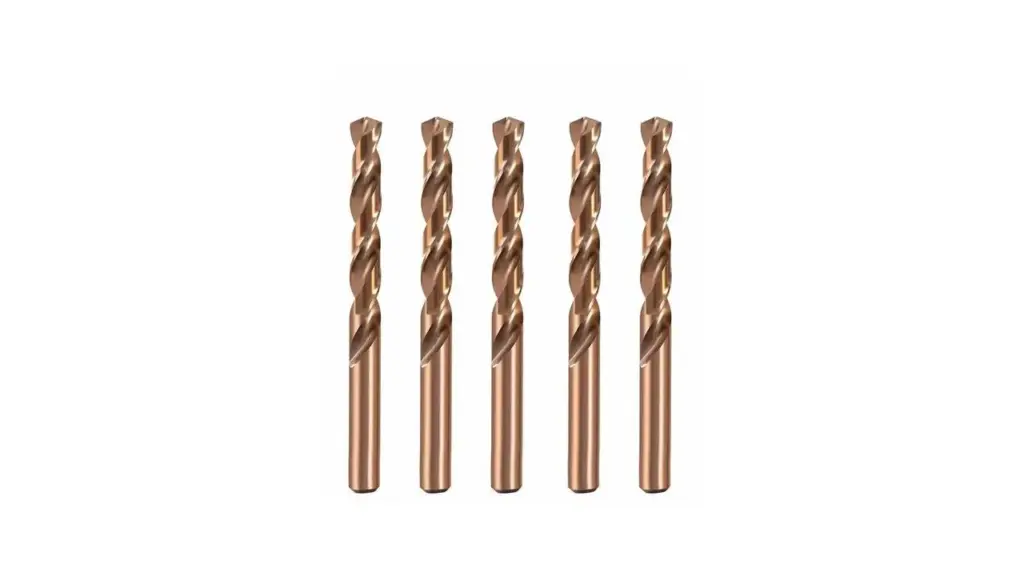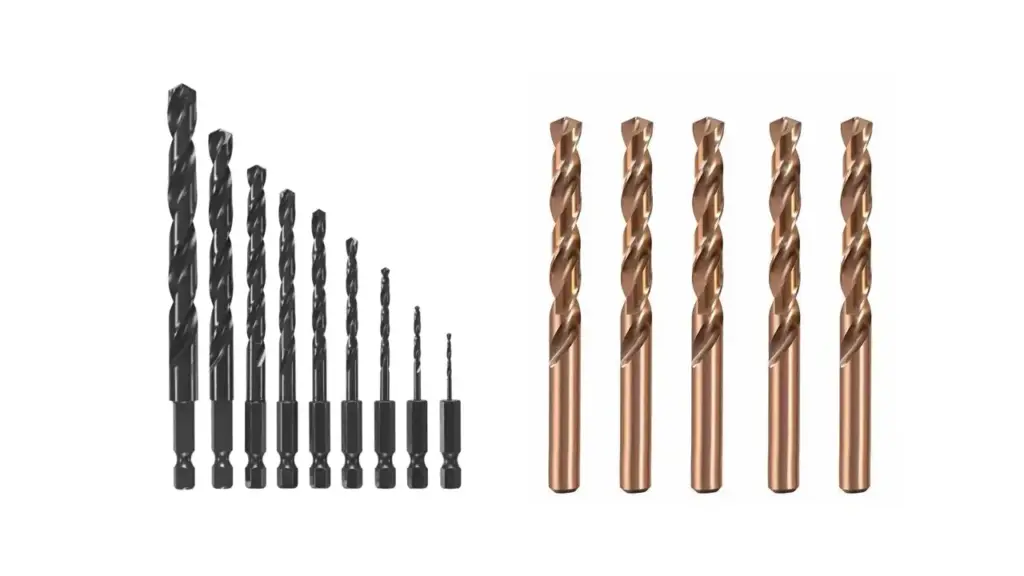When it comes to drilling, selecting the right drill bit is paramount for efficiency and achieving clean results. Two common types are black oxide and cobalt drill bits, each designed with distinct features and best-suited for different applications. Understanding the fundamental differences in their construction, performance, and ideal uses will empower you to make an informed decision for your specific drilling needs.
This blog post will delve into a detailed comparison of black oxide and cobalt drill bits. We’ll explore their material composition, manufacturing processes, and how these factors influence their performance when drilling through various materials. By highlighting their strengths and limitations, you’ll gain a clear understanding of when to choose one over the other, ultimately saving you time, effort, and money while ensuring successful drilling outcomes.
What Are Black Oxide Drill Bits

Black oxide drill bits are high-speed steel (HSS) drill bits that have undergone a surface treatment process called black oxide coating. This process involves exposing the heated steel to steam and chemicals, resulting in a thin, black, iron oxide layer on the surface.
This coating provides several benefits, including increased corrosion resistance, improved lubricity (reducing friction between the bit and the workpiece), and a slight improvement in chip flow. While offering a step up from uncoated HSS bits, black oxide drill bits do not significantly enhance the hardness or heat resistance of the underlying steel and are best suited for drilling softer materials like wood, plastic, and non-ferrous metals.
What Are Cobalt Drill Bits

Cobalt drill bits are a type of high-speed steel (HSS) drill bit that has been alloyed with a specific percentage of cobalt, typically ranging from 5% to 8%. This addition of cobalt significantly enhances the bit’s inherent hardness, strength, and, most importantly, its resistance to heat.
The superior heat resistance allows cobalt drill bits to maintain their cutting edge sharpness even when drilling at higher speeds and through tough materials like stainless steel, cast iron, and hardened alloys, where standard HSS bits would quickly dull or fail. While they come at a higher cost than regular HSS or titanium-coated bits, their extended lifespan and ability to tackle challenging materials make them a valuable tool for demanding drilling applications.
Black Oxide Drill Bits vs Cobalt

Choosing the right drill bit can significantly impact the efficiency and outcome of your drilling tasks. Black oxide and cobalt drill bits are two common types, each offering distinct advantages and disadvantages. Black oxide bits are a cost-effective option for general-purpose drilling, while cobalt bits are engineered for superior performance in demanding applications involving hard materials.
Understanding their fundamental differences in construction, performance, cost, and longevity is key to making an informed decision.
Material and Construction
Black oxide drill bits are manufactured from high-speed steel (HSS) that undergoes a chemical treatment to create a thin, black oxide layer on the surface. This layer primarily serves to improve corrosion resistance and provide a slight increase in lubricity, which helps reduce friction during drilling. The black oxide coating itself does not significantly enhance the hardness or heat resistance of the underlying HSS. Consequently, these bits rely on the base material’s properties for their cutting ability and durability.
Cobalt drill bits, in contrast, are made from HSS that has been alloyed with cobalt, typically ranging from 5% to 8%. This integral addition of cobalt throughout the bit’s composition dramatically increases its hardness, strength, and, most importantly, its ability to withstand high temperatures generated during drilling. Unlike coated bits, the performance benefits of cobalt are not limited to a surface layer, meaning the bit retains its superior characteristics even after resharpening. This makes them exceptionally well-suited for demanding applications.
Performance and Application
Black oxide drill bits are best suited for drilling into softer materials such as wood, plastic, and non-ferrous metals like aluminum and copper. They can also handle mild steel for general-purpose tasks. However, when used on harder metals, they tend to dull quickly due to their limited heat resistance and hardness. They are a cost-effective choice for basic drilling needs where extreme durability or the ability to cut through tough materials is not a primary concern.
Cobalt drill bits excel in drilling hard and abrasive materials, including stainless steel, cast iron, titanium, and hardened alloys. Their superior heat resistance allows them to maintain a sharp cutting edge even under the intense friction and heat generated when working with these challenging materials. This results in cleaner, more accurate holes and a significantly longer lifespan compared to black oxide bits in such applications. They are the preferred choice for professionals and serious DIYers who frequently encounter tough drilling tasks.
Cost and Longevity
Black oxide drill bits are generally the most economical option upfront, making them attractive for budget-conscious users and those with occasional drilling needs in softer materials. However, their shorter lifespan when used on harder materials can lead to more frequent replacements over time.
Cobalt drill bits come with a higher initial cost due to the expensive cobalt alloy used in their construction. However, their exceptional durability and ability to effectively drill hard materials often translate to a longer overall lifespan, especially in demanding applications. For professionals who rely on their tools daily, the increased investment in cobalt bits can be offset by their extended service life and superior performance, ultimately leading to better long-term value.
| Feature | Black Oxide Drill Bits | Cobalt Drill Bits |
| Material | HSS with a black oxide surface finish | HSS alloyed with 5-8% Cobalt throughout |
| Heat Resistance | Low | Excellent, maintains sharpness at high temperatures |
| Hardness | Basic HSS hardness | High, uniform hardness throughout the bit |
| Friction | Moderate | Moderate |
| Best For | Soft wood, plastic, non-ferrous metals, light use | Hard metals (stainless steel, cast iron, titanium alloys) |
| Durability | Lower lifespan, especially on harder materials | Longer lifespan, especially in demanding applications |
| Cost | Least expensive | More expensive |
| Resharpening | Standard HSS performance after resharpening | Retains performance characteristics after resharpening |
Black Oxide vs Titanium vs Cobalt Drill Bits
Choosing the correct drill bit is paramount for achieving clean, efficient holes and ensuring the longevity of your tools. Black oxide, titanium-coated, and cobalt drill bits represent a spectrum of options, each engineered with distinct properties. Black oxide offers a basic level of protection and performance for general use.
Titanium-coated bits enhance surface hardness and reduce friction for improved drilling in various materials. Cobalt drill bits stand out for their superior heat resistance and hardness, making them ideal for demanding applications involving tough metals. Understanding these key differences will empower you to select the optimal drill bit for your specific needs.
Material and Construction
Black oxide drill bits are manufactured by treating standard high-speed steel (HSS) with a chemical process that creates a thin, black oxide layer on the surface. This coating provides mild corrosion resistance and a slight improvement in lubricity, reducing friction during drilling. However, it does not significantly increase the bit’s hardness or heat resistance, as these properties are determined by the underlying HSS. Black oxide bits are typically the most economical option and are suitable for general-purpose drilling in softer materials.
Titanium drill bits are also typically made from HSS but are distinguished by a thin, hard coating of titanium nitride (TiN). This gold-colored coating significantly increases the surface hardness of the bit and reduces friction between the bit and the material being drilled. As a result, titanium-coated bits tend to stay sharper for longer than black oxide bits when drilling materials like wood, plastic, and softer metals. However, the coating is only a surface treatment, and the core material remains standard HSS, offering moderate heat resistance. Once the coating wears off, the bit’s performance will revert to that of an uncoated HSS bit.
Cobalt drill bits are fundamentally different as they are constructed from an HSS alloy containing 5% to 8% cobalt. This integral alloying provides uniform hardness and exceptional heat resistance throughout the entire bit. The presence of cobalt allows these bits to maintain their cutting edge sharpness even at high temperatures generated when drilling through very hard and abrasive materials. Unlike coated bits, the performance benefits of cobalt are inherent to the material itself, ensuring consistent performance even after resharpening.
Performance and Application
Black oxide drill bits are best suited for drilling softer materials such as wood, soft plastics, and non-ferrous metals like aluminum and copper. They can handle light-duty drilling in mild steel but may dull relatively quickly under continuous use or when encountering harder metals. They are a practical choice for basic DIY tasks and general drilling needs where extreme durability or cutting power is not required.
Titanium drill bits offer improved performance over black oxide bits in a broader range of materials, including hardwoods, fiberglass, PVC, and various types of steel. The reduced friction and increased surface hardness facilitate smoother and more efficient drilling, extending the bit’s lifespan compared to black oxide in these applications. They represent a good middle ground for users who need enhanced durability and performance for general to medium-duty drilling tasks.
Cobalt drill bits are specifically engineered for drilling hard and tough materials like stainless steel, cast iron, titanium alloys, and hardened steel. Their superior heat resistance prevents premature dulling and allows for higher drilling speeds in these challenging materials. They are the preferred choice for professionals in metalworking, machining, and construction who frequently encounter demanding drilling applications where other types of bits would quickly fail.
Cost and Longevity
Black oxide drill bits are the most budget-friendly option initially, making them accessible for a wide range of users. However, their shorter lifespan, especially when used on harder materials, may lead to more frequent replacements, potentially increasing the overall cost in the long run for demanding tasks.
Titanium drill bits are typically more expensive than black oxide bits but offer a better balance of performance and cost for general-purpose drilling. Their increased durability due to the titanium coating can extend their lifespan compared to black oxide bits, making them a worthwhile investment for many DIYers and light industrial users.
Cobalt drill bits represent the highest initial investment among the three types. However, their exceptional durability and ability to effectively drill hard materials often result in a longer service life, especially in professional or heavy-duty applications. The reduced need for frequent replacements and the ability to tackle tough jobs efficiently can make cobalt bits the most cost-effective choice in the long term for users who frequently work with challenging materials.
| Feature | Black Oxide Drill Bits | Titanium Drill Bits | Cobalt Drill Bits |
|---|---|---|---|
| Material | HSS with a black oxide surface finish | HSS with a Titanium Nitride (TiN) coating | HSS alloyed with 5-8% Cobalt throughout |
| Heat Resistance | Low | Moderate, coating helps reduce heat | Excellent, maintains sharpness at high temperatures |
| Hardness | Basic HSS hardness | Increased surface hardness due to coating | High, uniform hardness throughout the bit |
| Friction | Moderate | Low due to the coating | Moderate |
| Best For | Soft wood, plastic, non-ferrous metals, light use | Wood, most metals, general-purpose drilling | Hard metals (stainless steel, cast iron, titanium alloys) |
| Durability | Lower lifespan, especially on harder materials | Longer lifespan than black oxide, coating can wear off | Longest lifespan in demanding, high-heat applications |
| Cost | Least expensive | Moderately expensive | Most expensive |
| Resharpening | Standard HSS performance after resharpening | Standard HSS performance after coating wears off | Retains performance characteristics after resharpening |
How to Choose Black Oxide and Cobalt Drill Bits
Selecting the right drill bit from the black oxide and cobalt options primarily depends on the hardness of the material you intend to drill and the frequency of your drilling tasks. Black oxide drill bits, being the more economical choice, are well-suited for softer materials like wood, plastics, and non-ferrous metals such as aluminum and copper.
They offer a decent performance for general DIY projects and light-duty drilling. However, for harder materials like steel or cast iron, their relatively lower heat resistance and hardness can lead to rapid dulling and decreased efficiency. If your projects mainly involve these softer materials and are not overly demanding, black oxide bits can be a cost-effective solution.
On the other hand, cobalt drill bits are engineered for superior performance when drilling into tough and abrasive materials like stainless steel, hardened alloys, and cast iron. Their inherent hardness and exceptional heat resistance allow them to maintain a sharp cutting edge even under demanding conditions, resulting in cleaner holes and a longer lifespan in such applications.
While they come at a higher initial cost, their durability and effectiveness on hard materials often make them a more economical choice in the long run for professionals and serious DIYers who frequently work with challenging materials.
Consider these factors when choosing between black oxide and cobalt drill bits:
- Material Hardness: For soft materials, black oxide is sufficient. For hard metals, cobalt is highly recommended.
- Frequency of Use: For occasional drilling in soft materials, black oxide is adequate. For frequent or prolonged use, especially on harder materials, cobalt bits will last longer.
- Heat Generation: Drilling hard materials generates more heat. Cobalt bits excel in dissipating heat and maintaining sharpness.
- Budget: Black oxide bits are more affordable initially, but cobalt bits can offer better long-term value for demanding tasks.
- Hole Quality: Cobalt bits tend to produce cleaner and more precise holes in hard materials due to their sustained sharpness.
- Drill Speed and Pressure: Cobalt bits can often withstand higher speeds and pressure when drilling hard materials compared to black oxide bits.
Conclusion
In summary, black oxide drill bits offer a cost-effective solution for general-purpose drilling in softer materials with basic corrosion resistance. However, they lack the inherent hardness and heat resistance required for demanding tasks. Cobalt drill bits, with their superior alloy composition, excel in drilling hard metals and maintaining sharpness under high temperatures, making them a more durable and efficient choice for tough applications.
For users primarily working with wood, plastic, and soft metals, black oxide bits can be sufficient for occasional tasks. However, professionals and DIY enthusiasts frequently drilling into harder materials will find that the longevity and performance of cobalt drill bits justify the higher initial investment. They provide greater efficiency and reduce the need for frequent bit replacements.
When sourcing drill bits wholesale from us, consider the primary applications of your customers. Offering both black oxide for general use and cobalt for more demanding tasks ensures you cater to a wider range of needs, with cobalt bits representing a premium option for enhanced performance and durability.


